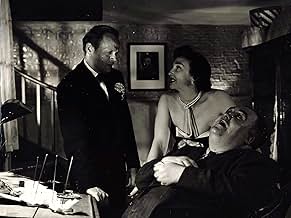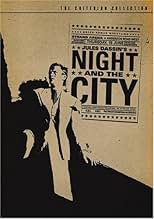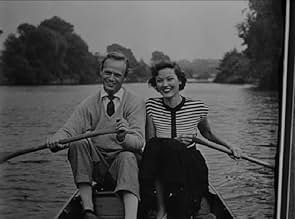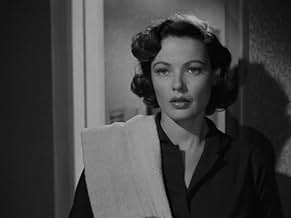IMDb-BEWERTUNG
7,8/10
16.074
IHRE BEWERTUNG
Ein kleiner Trickbetrüger und Nachtclub-Tourist nutzt einige zufällige Umstände aus und versucht, als Ringkampfveranstalter eine große Rolle zu spielen.Ein kleiner Trickbetrüger und Nachtclub-Tourist nutzt einige zufällige Umstände aus und versucht, als Ringkampfveranstalter eine große Rolle zu spielen.Ein kleiner Trickbetrüger und Nachtclub-Tourist nutzt einige zufällige Umstände aus und versucht, als Ringkampfveranstalter eine große Rolle zu spielen.
Ken Richmond
- Nikolas of Athens
- (as Ken. Richmond)
Paul Beradi
- Diner
- (Nicht genannt)
Derek Blomfield
- Young Policeman
- (Nicht genannt)
Clifford Buckton
- Policeman
- (Nicht genannt)
Ernest Butcher
- Bert
- (Nicht genannt)
Peter Butterworth
- Thug
- (Nicht genannt)
Naomi Chance
- Nightclub Hostess
- (Nicht genannt)
Edward Chapman
- Hoskins
- (Nicht genannt)
Empfohlene Bewertungen
Night and the City (1950)
*** (out of 4)
Hard-hitting crime film has Richard Widmark playing Harry Fabian, a loser who is constantly getting himself in trouble by either owing money or hurting those closest to him like the girl (Gene Tierney) who loves him. Soon Harry comes up with a scheme to try and take over the underworld of wrestling but an accident leaves an entire mob and city after him. Widmark, in an excellent performance, gets top-billing but there's no question that the real star here is the cinematography by Mutz Greenbaum. The B&W images are so incredibly strong here that they pretty much become their own character as the camera perfectly picks up this underworld full of gamblers, mobsters, drunken fools and hopeless dreamers like Harry. The cinematography is so strong here and director Dassin has no trouble at all building up a very rich atmosphere and it's almost as if you can smell the stink of the streets and you'll feel like a shower just to get all the smoke off of you. The story itself is pretty good because I'm sure everyone has come across a guy like Fabian so it's easy to see his tricks and enjoy his charisma but at the same time any sane person could see what a danger he was to himself. Widmark does a terrific job in the role because he's got a certain charm that you just have to fall for and at the same time he can be such a snake where you want to see something bad happen to him. The screenplay does a great job at really building up his character as we see his good and bad qualities and Widmark hits all the right notes with them. Tierney is excellent as well as his tortured girlfriend. Googie Withers, Herbert Lom, Hugh Marlowe and Francis L. Sullivan are all terrific as well. Back to the cinematography, the final scenes with Widmark running around London trying to escape are breathtakingly beautiful. We've seen countless chase scenes before and since this movie but the one here is a prime example of getting it done right.
*** (out of 4)
Hard-hitting crime film has Richard Widmark playing Harry Fabian, a loser who is constantly getting himself in trouble by either owing money or hurting those closest to him like the girl (Gene Tierney) who loves him. Soon Harry comes up with a scheme to try and take over the underworld of wrestling but an accident leaves an entire mob and city after him. Widmark, in an excellent performance, gets top-billing but there's no question that the real star here is the cinematography by Mutz Greenbaum. The B&W images are so incredibly strong here that they pretty much become their own character as the camera perfectly picks up this underworld full of gamblers, mobsters, drunken fools and hopeless dreamers like Harry. The cinematography is so strong here and director Dassin has no trouble at all building up a very rich atmosphere and it's almost as if you can smell the stink of the streets and you'll feel like a shower just to get all the smoke off of you. The story itself is pretty good because I'm sure everyone has come across a guy like Fabian so it's easy to see his tricks and enjoy his charisma but at the same time any sane person could see what a danger he was to himself. Widmark does a terrific job in the role because he's got a certain charm that you just have to fall for and at the same time he can be such a snake where you want to see something bad happen to him. The screenplay does a great job at really building up his character as we see his good and bad qualities and Widmark hits all the right notes with them. Tierney is excellent as well as his tortured girlfriend. Googie Withers, Herbert Lom, Hugh Marlowe and Francis L. Sullivan are all terrific as well. Back to the cinematography, the final scenes with Widmark running around London trying to escape are breathtakingly beautiful. We've seen countless chase scenes before and since this movie but the one here is a prime example of getting it done right.
My favorite Richard Widmark performance on the screen and probably his best work is Night and the City. This was director Jules Dassin's last film before settling in Europe in the wake of the blacklist and it has a first rate cast tuned to a fine pitch, like an orchestra without a bad note in it.
Harry Fabian is this smalltime American hustler/conman who's settled in London and always working that middle ground netherworld between the law and outright gangsterism. He really isn't a very likable man and the trick is to keep the audience care what's happening to him. This is the test of a great actor and Widmark is fully up to the challenge.
Fabian while working one of his cons overhears a piece of information about the father/son relationship between champion Graeco-Roman wrestler Gregorius the Great and gangster/promoter Cristo who is the London version of Vince McMahon. He cons Gregorius into thinking he wants to promote old style wrestling like Gregorius used to do. That con game sets in motion the events of the film that ultimately end in tragedy.
The cast is uniformly fine, but one performance really stands out, that of Stanislaus Zbyzsko as Gregorius. He was a real professional wrestling champion back in the day when it was real. Zbyzsko invests so much of his own life and reality as Gregorius that he's really something special. His scenes with Herbert Lom as his son are so good they go far beyond the plane of mere acting. It's some of the best work Lom has ever done as well.
How there weren't a few Oscar nominations from this is a mystery for me. For those who like film noir, this should be required viewing. Especially for you Richard Widmark fans.
Harry Fabian is this smalltime American hustler/conman who's settled in London and always working that middle ground netherworld between the law and outright gangsterism. He really isn't a very likable man and the trick is to keep the audience care what's happening to him. This is the test of a great actor and Widmark is fully up to the challenge.
Fabian while working one of his cons overhears a piece of information about the father/son relationship between champion Graeco-Roman wrestler Gregorius the Great and gangster/promoter Cristo who is the London version of Vince McMahon. He cons Gregorius into thinking he wants to promote old style wrestling like Gregorius used to do. That con game sets in motion the events of the film that ultimately end in tragedy.
The cast is uniformly fine, but one performance really stands out, that of Stanislaus Zbyzsko as Gregorius. He was a real professional wrestling champion back in the day when it was real. Zbyzsko invests so much of his own life and reality as Gregorius that he's really something special. His scenes with Herbert Lom as his son are so good they go far beyond the plane of mere acting. It's some of the best work Lom has ever done as well.
How there weren't a few Oscar nominations from this is a mystery for me. For those who like film noir, this should be required viewing. Especially for you Richard Widmark fans.
Recently out on Criterion DVD, with a restored print, this is a very nice example of 1950s film noir, although when it was made the director, Jules Dassin, didn't even know there was a classification known as film noir. In fact, the DVD extras, which include a fairly recent interview with the aging Dassin is as captivating as is the movie itself. Back in the late 1940s when "blacklisting" was a reality, Dassin was essentially told, go to London quickly, make this movie quickly, it may be your last. He made "Night and the City" without ever reading the source material, the book, and the movie is apparently quite different. Two versions were made simultaneously, using the same source film, but with different musical composers and different film editors. The DVD extras contains excerpts to demonstrate some of the differences, including a drastically different ending.
Good movie, worth a viewing for the acting of underrated Richard Widmark who plays Harry Fabian, an American post-war hustler in London. Fabian had big ideas of half-baked schemes and always was hitting up a friend for a hundred quid here, 300 quid there, to finance his latest get rich quick scheme. In the extras we learn that Gene Tierney was requested for the part of Fabian's girl Mary Bristol, because she was in a bad way after a recent romantic breakup, and according to Dassin "was suicidal." This movie helped bring her back to a good state.
Googie Withers, an actress I had never heard of, is good as Helen Nosseross, married to the rich but disgusting Phil (Francis Sullivan) and just wanting to get a license for her own night spot and a chance to break away from her husband. She is forced to deal with Fabian, a decision that cost her dearly.
Perhaps the most interesting actor is Stanislaus Zbyszko, one time "world's strongest man" from Poland, in 1949 living in New Jersey. Even though he was unexperienced, he gives a super performance as an old retired wrestler Gregorius the Great, who was grooming his son for a wrestling career. Mike Mazurki plays his nemesis, The Strangler.
Although the story gets a bit complex in the various relationships, it simply distills into Fabian seeing an opportunity to contract Gregorius to feature a wrestling match that will allow Fabian, at least in his eyes, to "control" wrestling in London. But his various scams catch up with him and all does not turn out well, as is the case in a film noir.
Good movie, worth a viewing for the acting of underrated Richard Widmark who plays Harry Fabian, an American post-war hustler in London. Fabian had big ideas of half-baked schemes and always was hitting up a friend for a hundred quid here, 300 quid there, to finance his latest get rich quick scheme. In the extras we learn that Gene Tierney was requested for the part of Fabian's girl Mary Bristol, because she was in a bad way after a recent romantic breakup, and according to Dassin "was suicidal." This movie helped bring her back to a good state.
Googie Withers, an actress I had never heard of, is good as Helen Nosseross, married to the rich but disgusting Phil (Francis Sullivan) and just wanting to get a license for her own night spot and a chance to break away from her husband. She is forced to deal with Fabian, a decision that cost her dearly.
Perhaps the most interesting actor is Stanislaus Zbyszko, one time "world's strongest man" from Poland, in 1949 living in New Jersey. Even though he was unexperienced, he gives a super performance as an old retired wrestler Gregorius the Great, who was grooming his son for a wrestling career. Mike Mazurki plays his nemesis, The Strangler.
Although the story gets a bit complex in the various relationships, it simply distills into Fabian seeing an opportunity to contract Gregorius to feature a wrestling match that will allow Fabian, at least in his eyes, to "control" wrestling in London. But his various scams catch up with him and all does not turn out well, as is the case in a film noir.
"Night and the City" was the final film for Jules Dassin in the U.S. before being blacklisted. He eventually moved to France but didn't make another film until 1955. Though he is best remembered for the films he did with his wife, Melina Mercouri, this is one of his great movies, a very gritty film noir with London as its background.
Richard Widmark plays Harry Fabian, a low-life con man who makes money as a tout for a club, i.e., he seeks out male tourists and gets them to spend their money there. The club is owned by Phil Nosseross (Francis L. Sullivan) and his wife Helen, who hates her husband and wants to start her own business. Working there is Fabian's girlfriend (Gene Tierney) who loves him in spite of the fact that he's constantly borrowing or stealing money from her.
Harry hits on a scheme to break into wrestling promotion in London. Unfortunately, Kristo (Herbert Lom) has it sewn up. Though his father (Stanislaus Zbyszko, a real-life wrestler) was a great wrestling champion doing Greco-Roman boxing, Kristo does not promote it. This has actually caused a rift between father and son, and Harry moves right in. With the elder Kristo on his side, Harry gets his chance to promote Greco-Roman wrestling. He gets the needed money by promising Helen that he will get her a license to open her business, though the building supposedly can't be licensed for another year. The results of Harry's project lead to tragedy as he brings everybody down with him.
Filmed in black and white only adds to the grittiness of "Night and the City" as Harry runs through London. The film moves as swiftly as he does, leading to the inevitable but exciting climax.
This was a powerhouse role for Richard Widmark, who is a slimy, desperate, and fast-talking Harry. The problem with Harry is, he's really not that good of a con man. He's sloppy. He can get guys into the club but that's about it. He rubs the wrong people the wrong way, and he makes everyone angry until finally, he's a complete untouchable as Kristo chases after him. Widmark gives us a perfect portrait. Tierney is in the film only at the request of Zanuck, who wanted to distract her from her personal problems; she has a surprisingly small role. Herbert Lom is fantastic as Kristo. Stanislaus Zbyszko, whom Dassin sought out, gives a poignant performance as Gregorius the Great. The wonderfully talented Googie Withers is great as the cold and sophisticated Helen. You totally believes she loathes her husband. And Sullivan's Nesseros is easy to loathe as a wealthy worm who plays both ends against the middle to destroy Fabian. They all end up destroying themselves.
Apparently this film did not get appropriate distribution or something, because it's a great film, now out on DVD, and very few people know it. Hopefully, like "Nightmare Alley," another film that was ill-served by Hollywood, it will continue to gain in cult status. It deserves to be seen.
Richard Widmark plays Harry Fabian, a low-life con man who makes money as a tout for a club, i.e., he seeks out male tourists and gets them to spend their money there. The club is owned by Phil Nosseross (Francis L. Sullivan) and his wife Helen, who hates her husband and wants to start her own business. Working there is Fabian's girlfriend (Gene Tierney) who loves him in spite of the fact that he's constantly borrowing or stealing money from her.
Harry hits on a scheme to break into wrestling promotion in London. Unfortunately, Kristo (Herbert Lom) has it sewn up. Though his father (Stanislaus Zbyszko, a real-life wrestler) was a great wrestling champion doing Greco-Roman boxing, Kristo does not promote it. This has actually caused a rift between father and son, and Harry moves right in. With the elder Kristo on his side, Harry gets his chance to promote Greco-Roman wrestling. He gets the needed money by promising Helen that he will get her a license to open her business, though the building supposedly can't be licensed for another year. The results of Harry's project lead to tragedy as he brings everybody down with him.
Filmed in black and white only adds to the grittiness of "Night and the City" as Harry runs through London. The film moves as swiftly as he does, leading to the inevitable but exciting climax.
This was a powerhouse role for Richard Widmark, who is a slimy, desperate, and fast-talking Harry. The problem with Harry is, he's really not that good of a con man. He's sloppy. He can get guys into the club but that's about it. He rubs the wrong people the wrong way, and he makes everyone angry until finally, he's a complete untouchable as Kristo chases after him. Widmark gives us a perfect portrait. Tierney is in the film only at the request of Zanuck, who wanted to distract her from her personal problems; she has a surprisingly small role. Herbert Lom is fantastic as Kristo. Stanislaus Zbyszko, whom Dassin sought out, gives a poignant performance as Gregorius the Great. The wonderfully talented Googie Withers is great as the cold and sophisticated Helen. You totally believes she loathes her husband. And Sullivan's Nesseros is easy to loathe as a wealthy worm who plays both ends against the middle to destroy Fabian. They all end up destroying themselves.
Apparently this film did not get appropriate distribution or something, because it's a great film, now out on DVD, and very few people know it. Hopefully, like "Nightmare Alley," another film that was ill-served by Hollywood, it will continue to gain in cult status. It deserves to be seen.
In London, the swindler Harry Fabian (Richard Widmark) is an ambitious loser, frequently taking money from his girlfriend Mary Bristol (Gene Tierney). When he meets the famous Greco-Roman wrestler Gregorius the Great (Stanislaus Zbyszko) in the arena of his son and the wrestling lord Kristo (Herbert Lorn), he plans a scheme to become successful. He cheats Greorious, promising clean combats in his own arena, and the old man accepts the partnership. However, without money to promote the fight, he invites his boss and owner of a nightclub Phil Nosseross (Francis L. Sullivan) to be his partner, but is betrayed and his business fails ending in a tragedy.
"Night and the City" is a great film-noir, with many twists and another excellent performance of Richard Widmark. The story shows the underworld of London, with low-lives, hustlers, beggars, gamblers and other amoral characters through a magnificent black and white cinematography. The direction of Jules Dassin is sharp and the screenplay perfectly develops the characters and the story in an excellent pace. The Brazilian distributor Oregon Filmes / Fox has one of the best collections of movies labeled "Tesouros da Sétima Arte" ("Treasures of the Seventh Art"). Unfortunately, most of their DVDs shamefully have problems while playing the film, maybe because of the lack of quality of the laboratory they use. My vote is nine.
Title (Brazil): "Sombras do Mal" ("Shadows of Evil")
Note: On 10 October 2016, I saw this film again.
"Night and the City" is a great film-noir, with many twists and another excellent performance of Richard Widmark. The story shows the underworld of London, with low-lives, hustlers, beggars, gamblers and other amoral characters through a magnificent black and white cinematography. The direction of Jules Dassin is sharp and the screenplay perfectly develops the characters and the story in an excellent pace. The Brazilian distributor Oregon Filmes / Fox has one of the best collections of movies labeled "Tesouros da Sétima Arte" ("Treasures of the Seventh Art"). Unfortunately, most of their DVDs shamefully have problems while playing the film, maybe because of the lack of quality of the laboratory they use. My vote is nine.
Title (Brazil): "Sombras do Mal" ("Shadows of Evil")
Note: On 10 October 2016, I saw this film again.
Wusstest du schon
- WissenswertesDirector Jules Dassin made the film while in the process of being blacklisted. Fox studio chief Darryl F. Zanuck told him it could possibly be the last film he'd ever direct, so he should shoot the most expensive scenes first so the studio wouldn't be able to blacklist him until it was completed.
- PatzerAs Harry is being chased through the streets of London at night, he runs down a set of stairs, then turns and runs down a lit street. In the foreground, the cameraman and director's shadows are clearly outlined against the street.
- Zitate
Opening voice-over: Night and the city. The night is tonight, tomorrow night... or any night. The city is London.
- Alternative VersionenThere are two versions of this film: the British release and the International/American release. Some examples are: a differing voice-over speech; some changed dialogue; the opening scene where Harry returns home after 3 days away is a different take and the nightclub scenes are longer in the British version. The scores of the two films are also entirely different and alternate shots are used at the ending in the British version.
- VerbindungenEdited into American Cinema: Film Noir (1995)
- SoundtracksHere's to Champagne
(uncredited)
Written by Noel Gay
Performed by Gene Tierney (voice dubbed by Maudie Edwards)
Top-Auswahl
Melde dich zum Bewerten an und greife auf die Watchlist für personalisierte Empfehlungen zu.
- How long is Night and the City?Powered by Alexa
Details
- Erscheinungsdatum
- Herkunftsland
- Sprache
- Auch bekannt als
- Night and the City
- Drehorte
- Hammersmith Bridge, Hammersmith, London, England, Vereinigtes Königreich(Harry runs across this bridge after leaving Figler's hideout, running to Anna O'Leary's boat shop)
- Produktionsfirmen
- Weitere beteiligte Unternehmen bei IMDbPro anzeigen
Box Office
- Weltweiter Bruttoertrag
- 43.024 $
- Laufzeit1 Stunde 41 Minuten
- Farbe
- Seitenverhältnis
- 1.37 : 1
Zu dieser Seite beitragen
Bearbeitung vorschlagen oder fehlenden Inhalt hinzufügen

Oberste Lücke
By what name was Die Ratte von Soho (1950) officially released in India in English?
Antwort



































